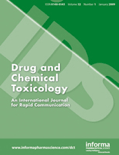
DRUG AND CHEMICAL TOXICOLOGY
Scope & Guideline
Exploring the intersection of health and chemical science.
Introduction
Aims and Scopes
- Chemical Toxicology:
The journal emphasizes the study of toxic effects caused by various chemicals, including drugs, pesticides, and industrial chemicals, on biological systems. - Pharmacological Safety Assessment:
Research in this area focuses on evaluating the safety and efficacy of pharmaceuticals, including the investigation of side effects, toxicity, and therapeutic potential. - Environmental Toxicology:
The journal covers studies related to the impact of environmental pollutants on health and ecosystems, assessing risks and providing insights into mitigation strategies. - Natural Products and Phytochemistry:
Research involving the toxicity and protective effects of natural compounds and herbal extracts, exploring their potential benefits and risks. - Molecular Mechanisms of Toxicity:
Studies investigating the biochemical and molecular pathways through which toxic agents exert their detrimental effects on cells and organisms. - In Vitro and In Vivo Toxicity Studies:
The journal publishes research involving both in vitro (cell-based) and in vivo (animal model) studies to assess toxicological outcomes and mechanisms.
Trending and Emerging
- Nanotoxicology:
An increasing number of studies are being published on the toxicity of nanomaterials, exploring their interactions with biological systems and potential health risks. - Environmental Mixture Toxicology:
There is a growing interest in understanding the effects of chemical mixtures and their cumulative impacts on health and the environment, reflecting real-world exposure scenarios. - Biomarker Development and Toxicogenomics:
Research is trending towards the identification of biomarkers and the application of toxicogenomic approaches to elucidate the effects of toxicants at the molecular level. - Neurotoxicity Studies:
A significant increase in research focusing on neurotoxic effects, particularly concerning the impact of various chemicals on neuronal health and behavior. - Protective Effects of Natural Compounds:
Emerging studies are increasingly investigating the protective roles of natural compounds against chemical-induced toxicity, highlighting the potential of herbal remedies in toxicology.
Declining or Waning
- Traditional Chemical Toxicology:
There appears to be a decreasing emphasis on traditional toxicology studies that do not incorporate modern methodologies such as in silico modeling or advanced molecular techniques. - Single-agent Toxicity Studies:
Research focusing solely on the toxicity of individual compounds is being overshadowed by studies that explore complex mixtures and environmental interactions, reflecting a shift towards more ecologically relevant research. - Pharmaceutical Toxicity without Mechanistic Insights:
There is a noticeable decline in studies reporting pharmaceutical toxicity without delving into the underlying mechanisms, as the field increasingly values mechanistic understanding.
Similar Journals

BULLETIN OF ENVIRONMENTAL CONTAMINATION AND TOXICOLOGY
Advancing understanding of environmental health.BULLETIN OF ENVIRONMENTAL CONTAMINATION AND TOXICOLOGY, published by SPRINGER, is a pivotal journal in the fields of Environmental Science, Toxicology, and Public Health. With a strong history of dissemination since its inception in 1966, the journal predominantly focuses on the latest advances in understanding environmental contaminants and their toxicological effects on health and ecosystems. It currently holds a respectable Q2 ranking across multiple categories including Health, Toxicology and Mutagenesis, Medicine (miscellaneous), and Pollution, as per the 2023 metrics. While the journal is not Open Access, it provides an invaluable platform for researchers, professionals, and students seeking to contribute to and stay informed on critical issues regarding environmental hazards and their implications. With an engaged community of scholars and practitioners, this journal continues to be an essential resource for addressing the pressing challenges of environmental contamination and its health impacts, guiding future research and policy decisions.

CHEMICAL RESEARCH IN TOXICOLOGY
Exploring the intricate relationship between chemistry and health.Chemical Research in Toxicology is a premier journal published by the American Chemical Society, dedicated to advancing the understanding of toxicological effects associated with chemical substances. Since its inception in 1988, this esteemed journal has maintained a robust impact factor, ranking in the Q1 quartile for both Medicine (miscellaneous) and Toxicology as of 2023, reflecting its significance and influence in the fields of pharmacology and toxicology. With an impressive Scopus ranking at #16 out of 133 in the Toxicology category, it serves as a vital resource for researchers, professionals, and students seeking cutting-edge insights and scholarly articles that bridge the gap between chemistry and toxicological science. Although not an open-access publication, it continues to provide comprehensive analyses and original research that inform safe chemical practices and regulatory policies, further enhancing its role in public health and safety.

Toxicology Research
Connecting researchers to critical toxicological insights.Toxicology Research is a distinguished journal dedicated to advancing the field of toxicology through the dissemination of high-quality research. Published by Oxford University Press, this UK-based journal focuses on critical aspects of toxicology and mutagenesis, highlighting both environmental and pharmacological implications. With an ISSN of 2045-452X and an E-ISSN of 2045-4538, it serves as a valuable resource for researchers, professionals, and students alike. Currently categorized in the Q3 quartile for Health, Toxicology and Mutagenesis, as well as Toxicology in 2023, Toxicology Research maintains a visible presence in Scopus rankings, positioning itself within the targeted professional community. Although the journal operates without open access options, its importance in contributing to scientific discussions and policy formation is undeniable. Covering content from 2012 to 2024, it continues to provide insights into contemporary toxicological challenges, thereby fostering interdisciplinary collaborations and informing best practices in health and safety.

JOURNAL OF APPLIED TOXICOLOGY
Pioneering Research for Public Health and SafetyJOURNAL OF APPLIED TOXICOLOGY, published by Wiley, stands as a leading platform in the field of toxicology, focusing on the rigorous examination of chemical substances and their effects on biological systems. With an impressive Impact Factor, it ranks in the top quartile (Q2) for toxicology journals, reflecting its esteemed position within the scientific community. The journal, identifiable by its ISSN 0260-437X and E-ISSN 1099-1263, has been an invaluable resource since its inception in 1981, and it continues to serve as a conduit for innovative research and practical applications through 2024. Positioned at the forefront of the field, it garners recognition in the Scopus Rankings, where it ranks #31 out of 133 journals in the toxicology category, placing it in the 77th percentile—a testament to its contribution to the advancement of pharmacology and toxicological sciences. While not an open-access journal, it remains accessible to a wide audience of researchers, professionals, and students eager to explore cutting-edge findings in applied toxicology, making it a pivotal resource for enhancing knowledge and fostering collaboration in the field.
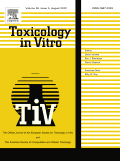
TOXICOLOGY IN VITRO
Exploring the Frontiers of In Vitro ToxicologyTOXICOLOGY IN VITRO is a premier journal published by PERGAMON-ELSEVIER SCIENCE LTD, focusing on the latest advancements in the field of toxicology, particularly through in vitro methodologies. With an ISSN of 0887-2333 and an E-ISSN of 1879-3177, this journal serves as a critical platform for researchers aiming to disseminate their findings in toxicology, emphasizing innovative approaches and applications in pharmacology and toxicology. Featuring a commendable impact factor and classified in the second quartile (Q2) for both Medicine (miscellaneous) and Toxicology in 2023, the journal holds a significant position within the academic community, ranking 41st out of 133 in the Toxicology category according to Scopus, representing the 69th percentile. Despite being a subscription-based publication, it continuously attracts submissions from leading scientists worldwide, fostering a vibrant exchange of scientific knowledge. Since its inception in 1987, TOXICOLOGY IN VITRO has consistently aimed to enhance understanding of toxicological challenges, making it an invaluable resource for professionals, students, and researchers dedicated to developing safer pharmaceuticals and understanding the biological pathways influenced by potential toxic agents.
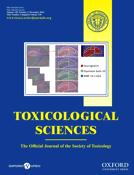
TOXICOLOGICAL SCIENCES
Unraveling Toxicity to Safeguard Our FutureTOXICOLOGICAL SCIENCES, published by Oxford University Press, is a premier journal in the field of toxicology that has been a cornerstone of scientific discourse since its inception in 1981. With an impressive 2023 impact factor and ranked in the Q1 category for Toxicology, this journal is highly regarded among researchers, professionals, and students dedicated to pharmacology and toxicology. The journal is committed to advancing the understanding of toxicological science, covering a breadth of topics that include the mechanisms of toxicity, risk assessment, and the regulatory aspects affecting public health. With an ISSN of 1096-6080 and an E-ISSN of 1096-0929, TOXICOLOGICAL SCIENCES facilitates open access scholarly work, ensuring that critical research reaches a global audience and promotes collaborative learning. As it converges towards 2024, the journal remains pivotal in shaping the future of toxicology research, providing insights that are essential for developing safer chemicals and protecting environmental health.
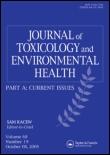
JOURNAL OF TOXICOLOGY AND ENVIRONMENTAL HEALTH-PART A-CURRENT ISSUES
Pioneering Insights into Human Health and Environmental AgentsJOURNAL OF TOXICOLOGY AND ENVIRONMENTAL HEALTH-PART A-CURRENT ISSUES, published by Taylor & Francis Inc, stands as a key resource in the interdisciplinary field of toxicology and environmental health. Operating under the ISSN 1528-7394 and E-ISSN 1087-2620, this journal maintains a strong presence with a Q2 category ranking in Health, Toxicology and Mutagenesis and a Q3 ranking in Toxicology as of 2023. It aims to disseminate critical findings that address contemporary issues in toxicology and environmental health, emphasizing the implications of environmental agents on human health. The journal offers both subscription and open access options, making cutting-edge research accessible to a diverse readership. With coverage of key topics from 1998 to 2024, it is an essential platform for academics, professionals, and students seeking to stay at the forefront of environmental health sciences.
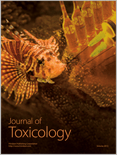
Journal of Toxicology
Innovating safety through cutting-edge toxicological research.Journal of Toxicology, published by HINDAWI LTD, stands as a pivotal open-access journal in the fields of toxicology and pharmacology since its inception in 2009. With an ISSN of 1687-8191 and an E-ISSN of 1687-8205, this journal is dedicated to disseminating high-quality research that critically examines the effects of toxic substances on living organisms. Located in Egypt and operating from their London office, it aims to provide an extensive platform for researchers worldwide to share findings that can inform better practices in safety and regulation. As of 2023, it has achieved significant recognition, holding a Q3 ranking in both the pharmacology and toxicology categories, and is indexed in Scopus with noteworthy percentile rankings (Toxicology: 57th and Pharmacology: 55th). With a focus on innovative studies and emerging areas such as environmental toxicology, biomarker research, and therapeutic interventions, the Journal of Toxicology invites both experienced researchers and students to contribute, thereby enhancing the breadth and depth of toxicological knowledge for the global scientific community.
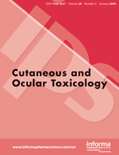
Cutaneous and Ocular Toxicology
Enhancing understanding of toxic effects through collaboration.Cutaneous and Ocular Toxicology, published by Taylor & Francis Ltd, is an essential resource in the fields of toxicology and pharmacology, focusing specifically on the effects of substances on the skin and eyes. With an ISSN of 1556-9527 and an E-ISSN of 1556-9535, this journal has been a vital platform for disseminating research since its inception in 1982, continuing its contributions to the scientific community through to 2024. Recognized for its academic rigor, it currently holds a Q3 ranking in the Medicine (miscellaneous) and Toxicology categories, reflecting its value among researchers and practitioners. The open access option enhances the journal's visibility and allows wider dissemination of knowledge, making it a key resource for professionals, students, and researchers dedicated to understanding and mitigating toxicological effects. Situated in the United Kingdom, Cutaneous and Ocular Toxicology strives to foster interdisciplinary collaboration and elevate the standards of toxicological research.
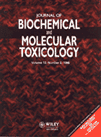
JOURNAL OF BIOCHEMICAL AND MOLECULAR TOXICOLOGY
Illuminating the Pathways of Biochemical and Molecular ScienceJournal of Biochemical and Molecular Toxicology, published by Wiley, plays a pivotal role in the advancement of knowledge within the fields of biochemistry, toxicology, and molecular biology. Established in 1998, this esteemed journal has garnered a significant reputation, evidenced by its current placement in the Q2 quartile across several categories, including Biochemistry, Health, Toxicology and Mutagenesis, and Medicine. With an ISSN of 1095-6670 and an E-ISSN of 1099-0461, it serves an international audience, offering critical insights and innovative research that shape our understanding of biochemical interactions and toxicological assessments. While it does not operate on an open-access model, the journal ensures rigorous peer review and high-quality publication standards, making it a valuable resource for researchers, professionals, and students dedicated to the exploration of molecular toxicology. The journal's recognized impact within the scientific community is reflected in its competitive rankings among specialized journals, fostering significant contributions to both academic and applied contexts.